Another popular choice amongst chicken breeds are barred rock chickens. This breed has many excellent features and qualities and (fortunately) very few negative ones. This bird is known to be quite hardy and able to deal with cold reasonably well. It is also known to be a substantial bird which can also help with colder temperatures. Not only this, but the barred rock has an interesting look to it with bi-colored feathers of dark gray to black and white. They also have bright red combs and wattles which makes for an interesting and attractive contrast.
Another benefit of this chicken breed is that they are great layers. They tend to lay a lot of eggs and they lay quite frequently. This means that whether you’re looking for eggs for your family or to grow your flock you’ll have some great luck with these birds. Some barred rock chickens have even been known to lay at least an egg every day so you’ll be on your way to growing your flock before you know it. You’ll also find that they can be very friendly to your family which means if you have children they will still make fun and interesting pets. You won’t get bored with these birds around.
The only drawback that has been touted for these birds is that they can sometimes be a bit bossy with other birds. If you have more docile chickens in your flock then you may want to watch your barred rocks around them. The barred rock chickens may be a little rough with them as some have noticed in their own flocks. On the other hand there are many who have had no trouble at all with their different types of chickens living together in one flock without fighting.
“The only drawback that has been touted for Barred Rock Chickens is that they can sometimes be a bit bossy with other birds.”
The History of Barred Rock Chickens
These chickens are considered a part of the Plymouth Rock family. There are several other chickens belonging to this category including silver penciled, partridge, white, buff, Columbian, blue and black. Most of these are actually quite rare breeds except for the barred rock chicken and the white Plymouth Rock. The others you likely won’t find as often or they will cost you a bit more in order to add them to your flock.
Barred rock chickens, however, you can find in many different places including farmers markets and farm supply stores.
It’s uncertain exactly where these chickens come from as no one knows exactly what breeds they are a cross-breed of. All that’s known is that these chickens are in fact American and they are also considered large fowl, bantam birds. They are quite common and are considered a dual-purpose bird because of their ability to lay so many eggs. They typically grow to approximately seven to eight pounds which categorizes them as ‘heavy’ birds. Even still they are extremely friendly and enjoying being handheld. They are a very docile bird and will do well in confinement though they prefer to be free range.
For Further Information on these beautiful birds :
 CLICK HERE FOR : Best Chicken Breeds
CLICK HERE FOR : Best Chicken Breeds
Where to Get Your Chickens
You may have already guessed that these birds are quite easy to locate. If you have a local farmer’s market you’ll likely be able to find Barred Rock Chickens for sale there (remember the barred birds are quite common). You’ll likely find them in farm supply stores during normal breeding times such as summer and spring. At these times many farm supply stores have different animals for sale along with all the supplies you could possibly need to take care of them. It’s definitely a win-win situation for you.
A benefit of picking up your birds in one of these places rather than online is you can actually see the exact bird you’re getting and check them over before you buy. You’ll also have plenty of options you can specifically see and you’ll have someone right there to answer any questions you might have about your birds and what you might need to raise them. On the other hand if you purchase online you may be able to be a little more negotiable on price. You can look at different sites to find different rates for Barred Rock chickens and you can also negotiate with sellers to get the specific ones that you want.


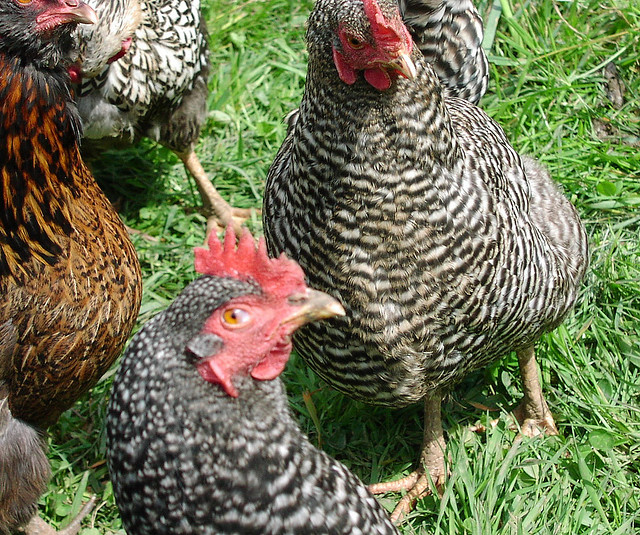
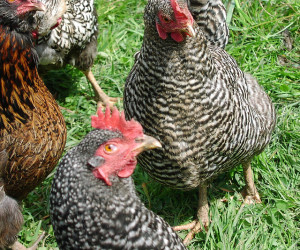
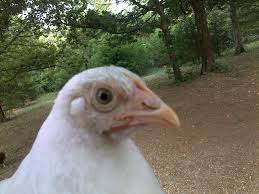
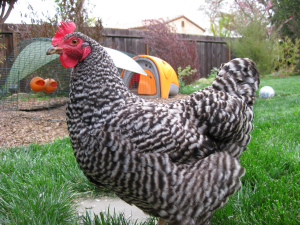

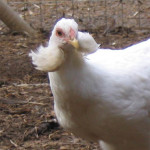
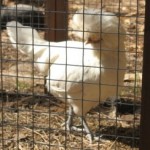



The last group of baby chicks I bought were 2 RIR’s & 3 Barred Rocks. Two of my barred rocks look like the breed, with the black & white & gray barred feathers, the other one is solid black with the exception of the head, which has a sort of yellow/off-white color around the eyes. I am wondering if this is a variation of the breed, or perhaps a different breed. I am interested to know, and thank you for any enlightenment you may be able to give…
Hi Janette,
Thanks for dropping a message – always interesting to hear about pet chickens!
Can you drop a photo of your “odd one out” – I am not sure what variation you have there!
Or alternatively you could ask the breeder – they should be the expert on their particular breed of chickens.
Please help! I rescued 2 baby Barred chickens but one didn’t make it so the one is big enough to go outside now and will not go outside or jump down from the storage bin in the house at all!! When I put her outside she plops on her side in the hot sun and won’t move or she stands at the door in the hot sun. There are 2 Americana chickens outside and she wants nothing to do with them. When I bring her back inside she gets happy and just perches on the edge of the bin and watches everyone with content….do you have any ideas?? Now I’ve been putting her outside every day for the last month and she try’s to commit chicken suicide every time??
Hi Tina!
What a beautiful pet chicken! I understand your problem, but it never ceases to amaze me how chickens can make such lovely pets.
Don’t give up hope! Your chicken does like being outside, the behavior you describe as laying on one side is actually how the chicken soaks up the sun – she loves it! The best way to assimilate here back into the flock is to keep her in an pen or enclosure next to the other chickens until they become familiar with each other. Then pop her in the roost with the others at night.
Might take some time, but keep trying!
When does the comb go really red if it is a cock ????
My 2 barred rocks are rescues- was told they are 1-2 years old. I’ve had them over 2 weeks and no eggs! Is this normal this time of year? One seems to be molting but is now growing back her feathers. They get layer feed and plenty mealworms and black oil sunflower seeds too.
Hi Sarah,
Young layers can be very irregular until they become fully matured. But note that no chickens lay every single day. Some are better than others, and due to selective breeding, the commercial chicken breeds have an extended run of laying, followed by a few days off. Then they will begin their laying cycle again, roughly aligned with the lunar calendar. Some breeds only lay for a few days out of 28, and have more rest day than laying days – it just depends on the breed. And most chickens will reduce their laying in the cooler months, and increase in warmer weather.
So there are many factors involved here, just be patient, and one day soon you may receive a pleasant surprise!
We have RIR and BR Hens and one BR rooster, We have separated him in his own coop now. He has become very aggressive with me ( Mom) and my children. That is one of the reasons we separated him and we don’t want him to fertilize the eggs. He will chase you like he is going to attack you. He is mean now. Is this normal and what can be done to stop this completely? He is a Handsome fellow but I cant have one that is or can be harmful. Thinking that I may need to sale him, I hate to do this but he is sneaky and will come after ya. Cant trust him. I certainly don’t want my children to get hurt or myself. Most important my children.
ANy suggestions?
Hi Melissa,
Roosters just seem to cause extra trouble! My only experience was to allow the flock to stick together, which seemed to calm him down a little, but he was still very protective of his girls! Of course, you have to take the eggs away from the hens each day. Otherwise I can only suggest that over time he might calm down, but it sounds as though he is getting worse. I sympathize with you on this problem as I have seen how they chase little kids, and it is very nasty!
Good luck with whatever you choose.
Mean or aggressive rooster. They can be educated pretty quickly as to who is in charge. Any use of force is a no-no, this is what a rooster lives for. You will only make him more aggressive by physically challenging him, which does neither of you any good. Your aggressive rooster sees you as someone who is trying to take over his flock. Simple fix and it has worked for me, more than once. Once he shows aggression, simply pick him up and walk around with him tucked under your arm. Walk and take care of simple tasks with him tucked in. Obviously you can’t do much carting around a rooster, but he will learn that you are the caretaker and he is still the protector. He won’t like it, but he will learn after a couple of “lessons”. Talking will calm him and it takes the air out of their sails.
Everyday I go out to the coop to pay my hens a visit before collecting eggs. I have only two Barred Rock among ten Rhode Island Reds. My B.R. get very excited when they hear me greet them. I bring one treat to the entire flock and spend quality time “chicken chattering” which they seem to enjoy. I also play classical music for them any time I am in there with them. They love it and try to sit close to the radio.My two B.R. love to be pet and will jump right up to me for attention, whereas only a few of the Reds will do that. I enjoy our flock of girls very much.